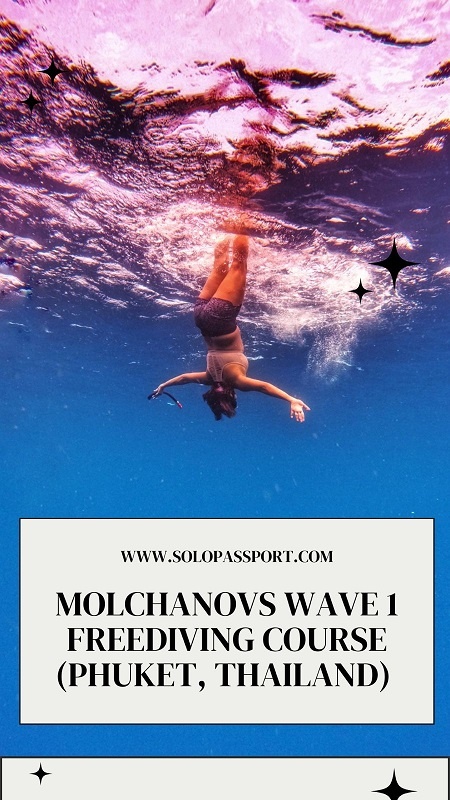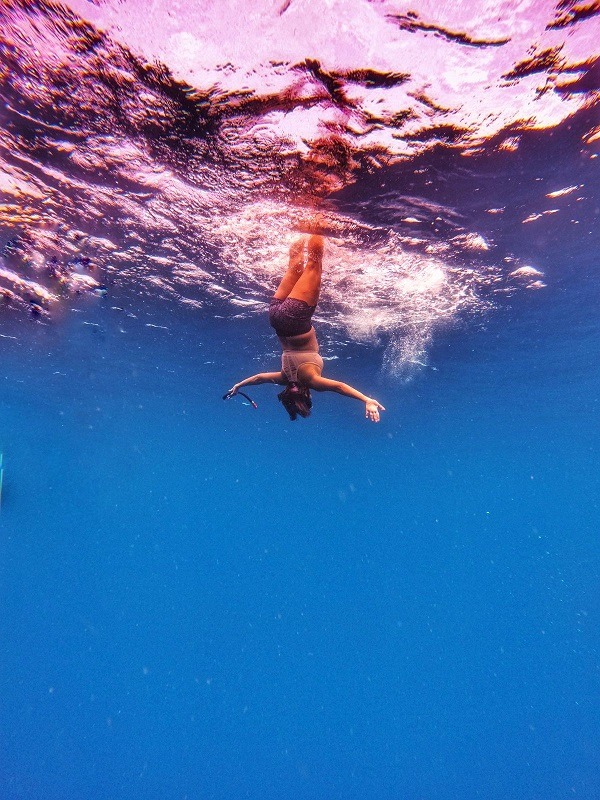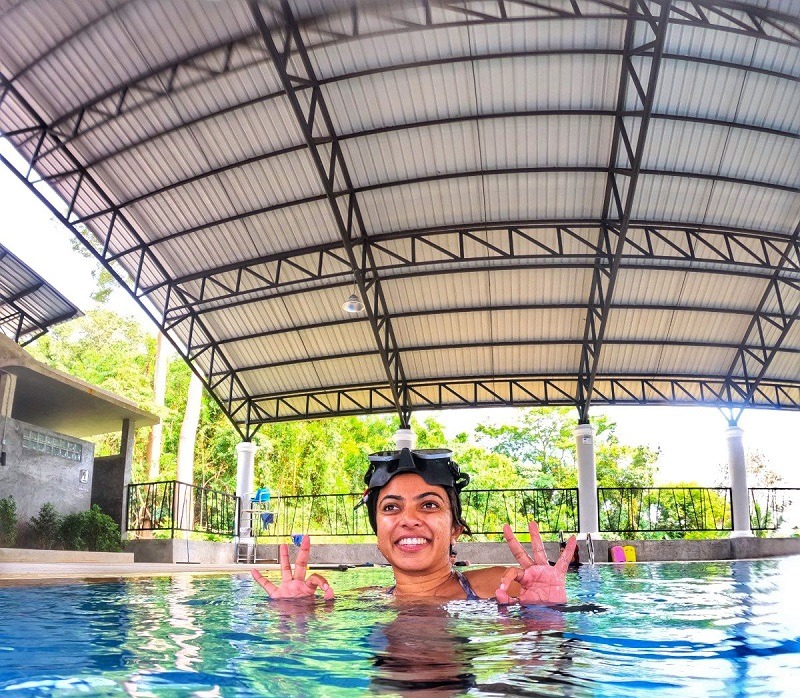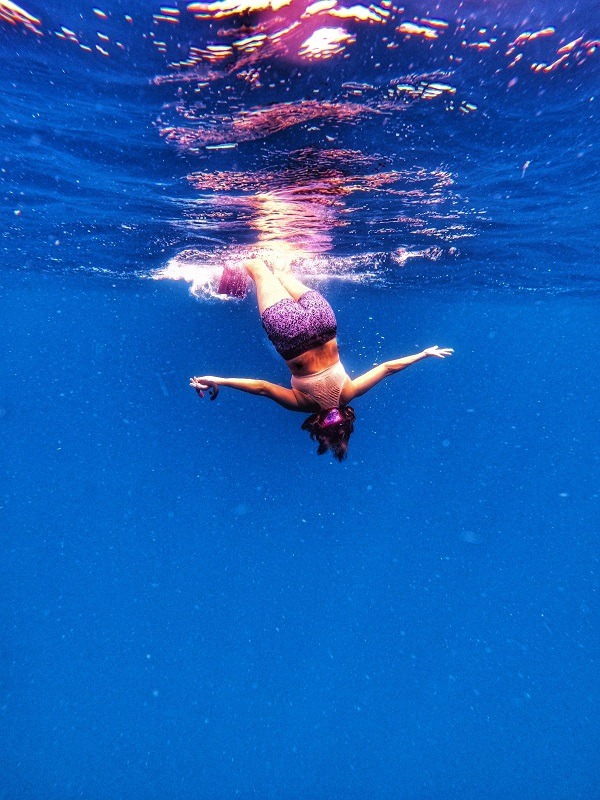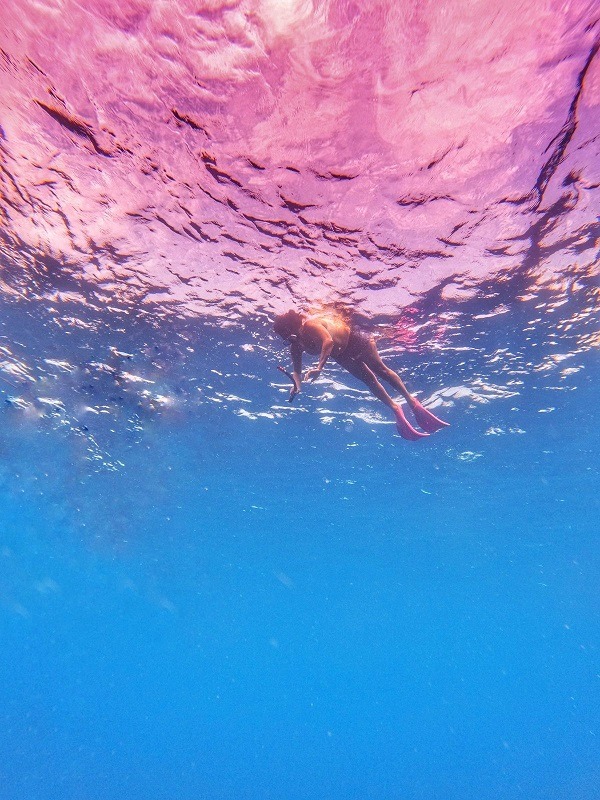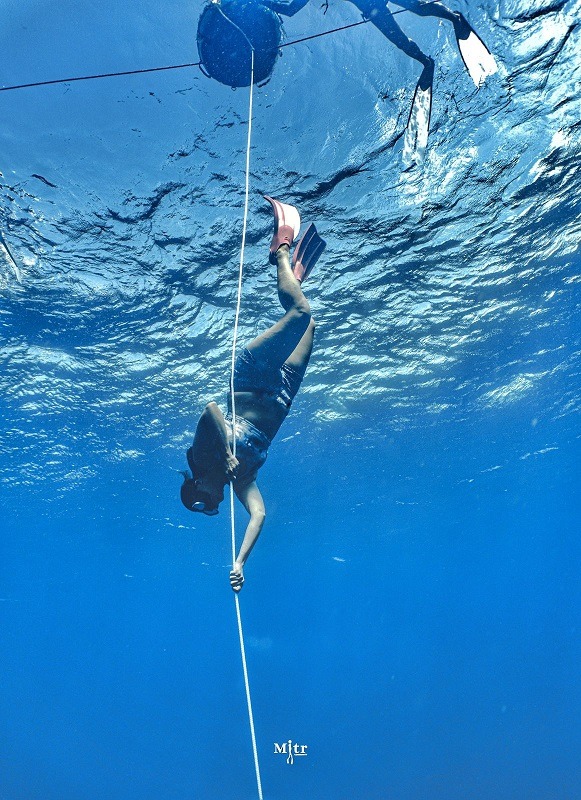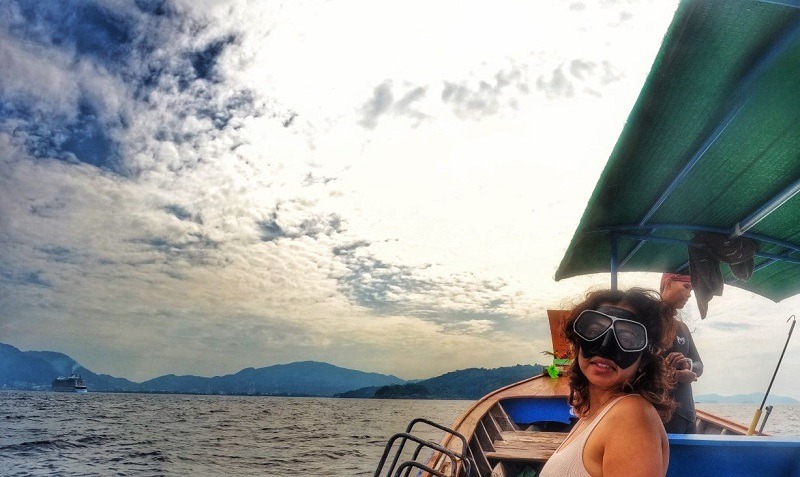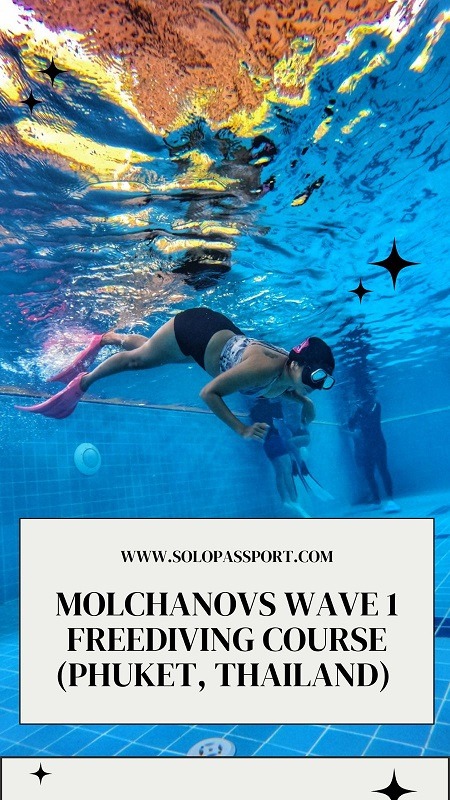Molchanovs Wave 1: Dive into a Freediving Course in Phuket (2024)
Immerse yourself in the art of freediving course in Phuket. Explore the depths of the Andaman Sea while mastering essential techniques under the guidance of expert instructors. Whether you’re a beginner or an experienced diver, Molchanovs’s tailored programs offer safe and thrilling journeys into the underwater world.
I first delved into freediving during a Pre-Bex tour organized by Travel Blog Exchange (TBEX) and Thailand Tourism last year. During this excursion, a select group of content creators, myself included, were treated to a half-day introduction to freediving and a pool session. During this immersive experience, I had an epiphany: I could excel in freediving with the proper skills and training. Motivated by this realization, I sought out the expertise of the Mitr Freediving Community in Phuket to embark on my journey towards completing the Molchanovs Wave 1 freediving course.
Page Contents
PIN for later reference – Freediving Course Phuket
This article may contain affiliate links, meaning if you decide to purchase via my links, I may earn a commission at no additional cost to you. For complete information, please see our affiliate disclaimer here.
About Freediving
Freediving, one of the oldest and most traditional forms of diving, involves submerging underwater while holding one’s breath. This skill relies solely on breath-holding as divers navigate beneath the surface until they resurface. Unlike other forms of diving, freediving does not involve using breathing apparatus or equipment. Popular activities within freediving include spearfishing, traditional fishing techniques, and target shooting, showcasing its diverse applications in aquatic pursuits.
What are the Advantages of Freediving?
Freediving offers numerous benefits, including:
- Stress Relief and Mental Clarity: The initial focus on relaxation and mental calmness makes freediving an effective stress-buster, promoting meditation and sharpening focus.
- Enhanced Flexibility and Self-Confidence: With no reliance on equipment, freediving is ideal for improving flexibility and boosting self-assurance as individuals easily navigate underwater.
- Improved Lung Capacity and Physical Strength: Engaging in freediving activities increases lung capacity, strengthens the body, and builds endurance over time.
What are the Disadvantages of Freediving?
While freediving offers numerous benefits, it also presents some drawbacks. One limitation is the depth restriction imposed by the diver’s ability to hold their breath underwater. Extended underwater exploration necessitates proper technique and skill to ensure safety and endurance.
Difference between Freediving and Scuba Diving
The primary distinction between freediving and scuba diving lies in breathing underwater. Scuba divers utilize a scuba regulator, which stands for Self-Contained Underwater Breathing Apparatus. This device connects to an air tank, providing divers with a continuous air supply. In contrast, freedivers hold their breath throughout the dive without relying on an underwater regulator or air supply.
Is freediving safer than scuba diving?
Freediving is often considered safer than scuba diving due to its self-reliant nature. While scuba diving heavily relies on equipment, freediving allows individuals to control their breathing and the duration they can hold their breath underwater. This self-dependence empowers freedivers to regulate their actions and mitigate risks more effectively.
Is freediving the same as snorkelling?
Freediving often begins with snorkelling, but it extends beyond surface exploration. While snorkelling keeps you at the water’s surface, breathing through a snorkel without holding your breath, freediving takes you deeper underwater. In freediving, divers submerge beneath the surface, holding their breath for extended periods while exploring the underwater world.
About Molchanovs
Introduced in 2018, the Molchanovs Movement was established to unite the global community of freedivers, providing access to cutting-edge freediving education, tailored workouts, exclusive early access to gear, and discounts. Founded by Natalia Molchanovs for the Russian Freediving Federation, this initiative aims to elevate the standards of freediving education worldwide.
Molchanovs Wave 1 Freediving Course Details
The Molchanovs Wave 1 freediving course represents the initial level of freediving instruction. This course prioritises your safety and concentration, equipping you with essential skills to become a proficient and attentive diver.
Eligibility Criteria
To enrol in the Molchanovs Wave 1 freediving course, it is imperative that you:
- Possess a clean bill of health from a medical standpoint.
- Demonstrate the capability to swim unaided for a continuous distance of 200 meters without interruption.
Theory Session
During the theory session, you’ll delve into freediving’s fundamental principles and science. This comprehensive exploration covers various aspects, including the physiological responses of the body underwater, breath-holding techniques, Boyle’s law, duck diving methods, safety protocols, and procedures for assisting and rescuing your dive buddy.
To prepare for this session, you’ll be required to thoroughly review the Molchanovs manual, which serves as a comprehensive guide providing all necessary information. Additionally, you’ll undergo an assessment with the instructor, validating and reinforcing your understanding of the manual’s content.
Day 1 – Pool Session
In the pool session, you’ll have the opportunity to acquire and hone essential skills in a controlled underwater environment. This session typically spans 3 to 4 hours, during which you’ll focus on mastering various techniques, including:
- Achieving static apnea for 1 minute and 30 seconds.
- Perfecting the duck dive technique.
- Completing a free dive for a distance of 35 meters.
- Practicing underwater turns.
- Learning rescue procedures for instances when your buddy experiences a blackout underwater.
These are just a few examples of the skills you’ll learn and practice during the pool session, as there are many more valuable techniques to explore and master.
Day 2 – Open Water Session
Day 2 marks the exciting transition to open water, where you put into practice the skills acquired on Day 1. In this dynamic environment, divers apply their learned techniques to explore greater depths. The session takes place around a guiding rope, providing a reference point and enhancing comfort in the ocean.
Divers navigate the open water using only fins, honing their abilities and gaining confidence in the expansive aquatic surroundings. Typically lasting around 3 hours, this session offers a thrilling opportunity to develop skills further and experience the wonders of freediving in natural settings.
Day 3 – Open Water Session
Day 3 is dedicated to skill assessment and further buddy diving and rescue techniques instruction. During this crucial phase of the course, you’ll be evaluated on the proficiency of the skills you’ve acquired throughout the training.
Additionally, you’ll receive comprehensive training on diving alongside a buddy and mastering rescue procedures, ensuring a safe and collaborative diving experience. The session in the open water extends for approximately 3 hours, providing ample time to refine skills, gain confidence, and solidify your understanding of essential freediving practices.
Passing Criteria and Examination
To attain certification as a Molchanovs Wave 1 freediver, successful completion of the following requirements is necessary:
Pool Requirements:
- Static apnea for 1 minute and 30 seconds.
- Free dive of 30 meters (dynamic with fins).
Open Water Requirements:
- Free dive ranging between 12 to 20 meters (constant weight with fins or free immersion).
- Buddy skill demonstration between 6 to 12 meters (constant weight with fins).
- Rescue skill demonstration between depths of 6 to 12 meters.
Meeting these criteria ensures a comprehensive understanding and proficiency in essential freediving skills, qualifying you as a certified Molchanovs Wave 1 freediver.
Dive School in Phuket
As mentioned, I partnered with the Mitr Freediving Community to undertake the Molchanovs Wave 1 freediving course. Affiliated with esteemed organizations such as the World Confederation of Underwater Activities (CMAS) and the Association of Thailand Underwater Sports (ATUS), this community comprises passionate divers dedicated to freediving. Their array of services includes:
- Freediving training and courses tailored to various skill levels, from beginners to advanced.
- Specialized training for honing specific skills required in freediving.
- Equipment rental to facilitate diving expeditions.
- Homestay accommodations for a comfortable and immersive diving experience.
Frequently Asked Questions (FAQ) About Freediving
Q: Is freediving easy to learn?
With the right skills and training, freediving is easy to learn. It does require practice and understanding your body.
Q: How do free divers hold their breath?
Freedivers devote themselves to training and mastering breath-holding underwater, striving to extend their breath-holding capabilities. They train their lungs through dedicated practice to endure more extended periods without air. Central to this discipline is cultivating a calm state of mind and body, which reduces heart rate and minimizes oxygen consumption, enabling freedivers to achieve remarkable breath-holding endurance.
Q: How long do free divers hold their breath?
Certain freedivers demonstrate extraordinary breath-holding abilities, with some capable of holding their breath for more than 10 minutes. For instance, Budimir Sobat holds a Guinness World Record for the longest breath-hold at an astounding 24 minutes and 37.36 seconds. While such feats are remarkable, individual capabilities vary widely. I’ve achieved a breath-hold of 1 minute and 40 seconds, a testament to the gradual improvement and dedication inherent in freediving practice.
Q: How long is Molchanov’s Wave 1 freediving course?
The Molchanovs Wave 1 freediving course spans three days, with a structured itinerary. The initial day focuses on pool training, providing a controlled environment for skill development. The subsequent two days transition to open water sessions, offering real-world application of acquired techniques amidst the ocean’s dynamic conditions. This comprehensive approach ensures a well-rounded and immersive learning experience throughout the course.
Q: How much does it cost to do the Molchanov Wave 1 freediving course?
The Molchanovs Wave 1 freediving course is priced at approximately 7900 Thai Baht, equivalent to around 240 USD. This comprehensive package encompasses the cost of the manual, theory lessons, necessary equipment, instructor fees, and boat charges, ensuring a hassle-free and all-inclusive learning experience for participants.
Q: What are the different waves and levels of Molchanovs freediving education?
Here is a summary of the different levels or waves of Molchanovs freediving education:
| Wave | Name | Description | Breathe Holding | Depth |
| Wave 1 | Introduction to Freediving | Entry-level course focusing on safety and foundational freediving skills. | > 1 minute 30 seconds | 12 to 20 metres |
| Wave 2 | Intermediate Freediving | Intermediate course delving deeper into technique and equalization. | > 2 minute 30 seconds | 24 to 30 metres |
| Wave 3 | Advance Freediving * | Advanced course advancing skills in depth and mastering equalization. | > 2 minutes 30 seconds | 34 to 40 metres |
| Wave 4 | Competitive Freediving | > 3 minutes 30 seconds | > 50 metres |
Closing Notes
Acquiring the skill of freediving and gaining insight into one’s body during underwater exploration is genuinely invaluable. Undertaking this course has been a gratifying experience, and I am confident that the knowledge gained will enhance my freediving abilities and contribute to my growth as a scuba diver.
Please note that this post was created with the Mitr Freediving Community. However, I want to emphasize that the views and opinions expressed herein are sincere and impartial.
How can you support me?
You know how much I love coffee, so you can buy me a coffee – Buy me Coffee!
Or you can purchase from one of the below travel resources without any extra charge to you:
Travel Resources
Book your flight on Skyscanner.com or Trip.com
Reserve your accommodation on Stay22
Reserve your stay at a hostel on HostelWorld
Use RentalCars or DiscoverCars for hiring self-driven cars
Book your tours and travels or purchase tickets on Viator or GetYourGuide
For a universal SIM card, use DrimSim
Buy comprehensive travel insurance on SafetyWing and WorldNomads
If you liked this article and if it was helpful in your planning or travelling, do share, tweet, or pin this post.
Follow me on Instagram | Facebook | YouTube | Twitter | LinkedIn
Do you have a question? Do you want any suggestions and tips for travel, hikes, and scuba dives? Use the Subscription box below to sign up and get updates by email.


